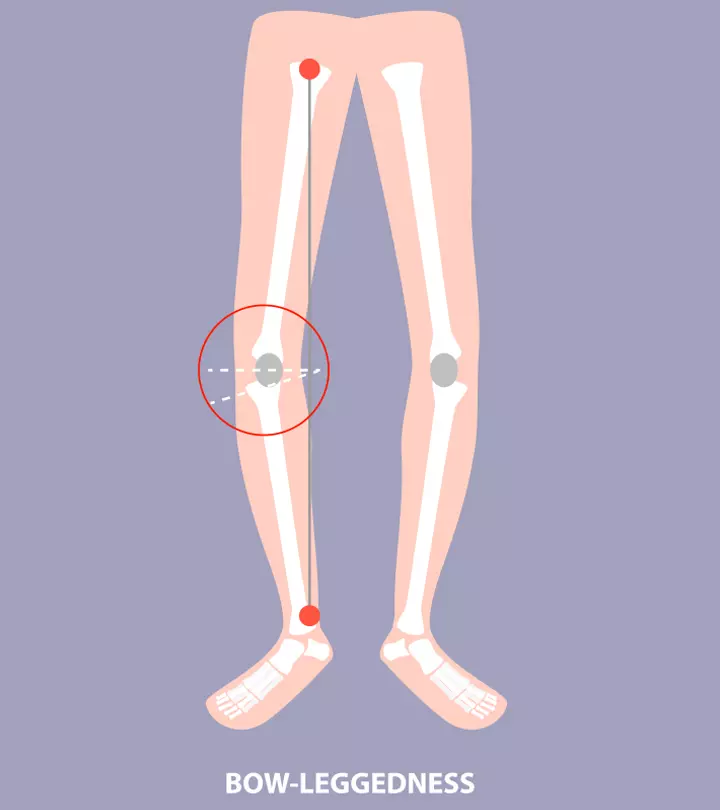
Image: ShutterStock
“How much castor oil to take to induce labor?” is a common concern for many women who consider taking castor oil near the due date. Ancient Egyptians used castor oil to induce labor. However, the safety and effectiveness of castor oil use for labor induction lack definitive scientific evidence. In addition, some women may get uterine contractions after a small dose of its administration; while a few may not see any difference even after taking more amounts.

Is it safe to take castor oil to induce labor? How does it induce labor? What is the right amount? Read on to learn more about the use of castor oil in labor induction methods.
Key Pointers
- There is a lack of definitive scientific evidence on the safety and efficacy of castor oil as a natural labor inducer, despite its historical usage.
- Women who previously had a c-section should refrain from consuming castor oil.
- Consumption of castor oil may result in adverse effects such as nausea, dehydration, diarrhea, and painful contractions that could make labor difficult.
- Reports indicate that the duration taken for labor induction after castor oil consumption varies with women.
- Castor oil functions as a laxative by targeting prostaglandin receptors in the intestines and uterus to induce contractions.
Is Castor Oil Safe To Induce Labor?
Though there is no scientific proof of its benefits, doctors and midwives used castor oil in the past for inducing labor, in the case of post-term pregnancies, which is after 40 weeks (1).
But it is rarely used now.
One study found that more than half of women at term who were administered castor oil went into active labor within 24 hours, while nearly half of the women who received the dose did not enter into labor (2).
Another study conducted ten years later and published in the Australian and New Zealand Journal of Obstetrics and Gynaecology found that castor oil did not show any notable side effects at the time of childbirth or during labor (3).
 Caution
CautionWhat Are The Risks Associated With Castor Oil?
Owing to its potential contraindications, most health practitioners usually do not recommend castor oil for inducing labor. Furthermore, it is known to cause the following risks to the mother and the baby:
- A small study published in the Cochrane database of systematic reviews found that all women who ingested castor oil experienced nausea (4) (5).
- It may cause hours of abnormal and painful contractions, which are not real labor pain. They can make you feel exhausted, making the labor difficult.
 Quick fact
Quick fact
Image: Shutterstock
How Is Castor Oil Thought to Work?
Better known for its laxative properties, castor oil is also believed to work in jump-starting the labor. A research paper published in the ‘Proceedings of the National Academy of Sciences,’ says the key ingredient of castor oil, ricinoleic acidiA major constituent of castor oil used in various industries, known to relieve pain and moisturize the skin , targets the prostaglandiniGroup of substances that play an essential role in producing inflammatory responses and other bodily processes receptors of the intestines and uterus to stimulate contractions (6).
- It is believed to cause cramps in the intestines, which stimulate the bowels and irritate the uterus to start contractions.
- It might also limit fluid absorption and electrolytes, thereby dehydrating the body and causing contractions.
How Much Castor Oil Is Needed To Induce Labor?

Image: Shutterstock
In a study, where labor was successfully induced in more than half of full-term women, a single dosage of 60ml was given (2). However, this is may not necessarily be the standard dosage of castor oil for inducing labor.
An anonymous blogger shares her experience of attempting to induce labor by using castor oil. She explains, “So I started with a small spoonful (of castor oil) on Saturday. Most recipes that I saw involved 1-2 tablespoons. No baby, mind you, but no diarrhea. So with increased boldness, I took two tablespoons on Sunday, mixed in with my yogurt, and waited…No labor.
“This time I gulped it from a shot glass and chased it with pomegranate juice. Anyway, I went to bed shortly after. I leaped out of bed and ran to the bathroom with water gushing out of me in an uncontrolled stream…I was hit by another contraction and some more mild diarrhea. I spent the next half hour pacing back and forth in our bedroom and timing contractions. I was surprised at how quickly they were coming – every 2-4 minutes (i).”
How Long Does It Take For Castor Oil To Induce Labor?
The time taken for active labor varies from individual to individual. Some of them may get within 24 hours, while some may take more time. Limited studies report about women going into active labor within 24, 36, and 48 hours of castor oil intake (7).
Castor Oil Recipes To Induce Labor – Aren’t They Interesting?
It is not advisable to use castor oil to induce labor. However, if you like the oil’s flavor and aroma and want to have it in your diet, check with your obstetrician. Meanwhile, here are some recipes people have tried as home remedies to take castor oil as a laxative.
- A smoothie can mask the pungent taste of castor oil. Put the required dosage in a mixture of juice, yogurt, and frozen fruit. The cold smoothie can easily flow down your throat.
- Beat three eggs along with castor oil and make an omelet out of it. You can top it up with salsa to make it taste better. However, heating may lower the effect of castor oil.

Image: Shutterstock
- Add two scoops of ice cream to the dose along with some orange juice. Have it before the ice cream melts.
Frequently Asked Questions
1. Can castor oil hurt a fetus?
According to a 2018 retrospective descriptive study, castor oil can induce labor with little or no complications to the mother and baby. Around 91% of the women who consumed castor oil were able to deliver vaginally (8). But since the study sample size was quite small, more targeted studies are required to validate the safety and efficacy of castor oil in natural labor induction.
2. Does castor oil dilate the cervix?
Castor oil has laxative properties that promote intestinal motility and stimulate the bowels. Hypothetically, this property of castor oil is considered to induce labor and contractions in pregnant females (9). Similarly, castor oil is believed to dilate the cervix and speed up labor. However, scientific studies don’t support this hypothesis (10).
3. Are there any other natural methods for inducing labor?
You may try natural methods like nipple stimulation to induce labor. Nipple stimulation increases the oxytocin hormone in the body, which aids in the process of labor induction (15).
Castor oil is a laxative due to the presence of ricinoleic acid that stimulates the intestinal and uterine muscles to contract. However, there’s no clear answer to how much castor oil to take to induce labor. The time for onset of labor after taking castor oil may vary from one woman to another, and no standard dosage exists. In addition, the effectiveness of castor oil to induce labor is not well documented and may lead to nausea or painful cramps if taken in large amounts. Therefore, doctors may not recommend consuming castor oil to start uterine contractions. However, check with your healthcare provider if you wish to incorporate castor oil into your diet.
Infographic: Possible Drawbacks Of Natural Ways Of Inducing Labor
Inducing labor is usually suggested when you have crossed your due date, or your water has broken, but contractions are yet to start. Natural ways of inducing labor lack adequate scientific evidence and may even be harmful if precautions are not followed. The infographic below highlights the possible drawbacks of the natural methods to induce labor. Illustration: Momjunction Design Team
Illustration: Can Castor Oil Induce Labor? Its Safety And Risks Involved

Image: Dalle E/MomJunction Design Team
Discover the safety of using castor oil to induce labor in this concise video. Is it a safe option? Find out!
Personal Experience: Source
MomJunction articles include first-hand experiences to provide you with better insights through real-life narratives. Here are the sources of personal accounts referenced in this article.
i. The 2nd labour story part i: in which castor oil is put to the test;https://ifbyyes.wordpress.com/2015/05/07/2nd-labour-story-castor-oil/#more-6959
References
1. Pregnancy and birth: When your baby’s due date has passed; Institute for Quality and Efficiency in Health Care (IQWiG) (2018)
2. Garry D et al.; Use of castor oil in pregnancies at term; Altern Ther Health Med (2000)
3. Boel ME et al.; Castor oil for induction of labour: not harmful, not helpful; Aust N Z J Obstet Gynaecol. (2009)
4. Kelly AJ et al.; Castor oil, bath and/or enema for cervical priming and induction of labour; Cochrane Database Syst Rev. (2013)
5. Sahar Abd El-Gawad; Castor Oil Safety and Effectiveness on Labour Induction and Neonatal Outcome; Research gate (2014)
6. Sorin Tunaru et al.; Castor oil induces laxation and uterus contraction via ricinoleic acid activating prostaglandin EP3 receptors; Proc Natl Acad Sci U S A. (2012)
7. RonitGilad et al.; Castor oil for induction of labor in post-date pregnancies: A randomized controlled trial; Elsevier Women and Birth Volume 31, Issue 1 (2018)
8. Andrea L DeMaria et al.; Castor oil as a natural alternative to labor induction: A retrospective descriptive study NCBI (2018)
9. Which method is best for the induction of labour? A systematic review, network meta-analysis and cost-effectiveness analysis NCBI
10. Josie L Tenore; Methods for cervical ripening and induction of labor NCBI (2003)
11. J M Shyken, R H Petrie; Oxytocin to induce labor NCBI
12. Castor oil as a natural alternative to labor induction: A retrospective descriptive study Science Direct
13. G. B. Sicuranza & R. Figueroa Uterine rupture associated with castor oil ingestion
14. Jeffrey Alookaran; Jayson Tripp; Castor Oil NIH
15. What natural ways to induce labor actually work, Cleveland Clinic
Community Experiences
Join the conversation and become a part of our nurturing community! Share your stories, experiences, and insights to connect with fellow parents.
Read full bio of Dr. Sangeeta Agrawal
Read full bio of Rebecca Malachi
Read full bio of Swati Patwal
Read full bio of Aneesha Amonz

 Research finds
Research finds















